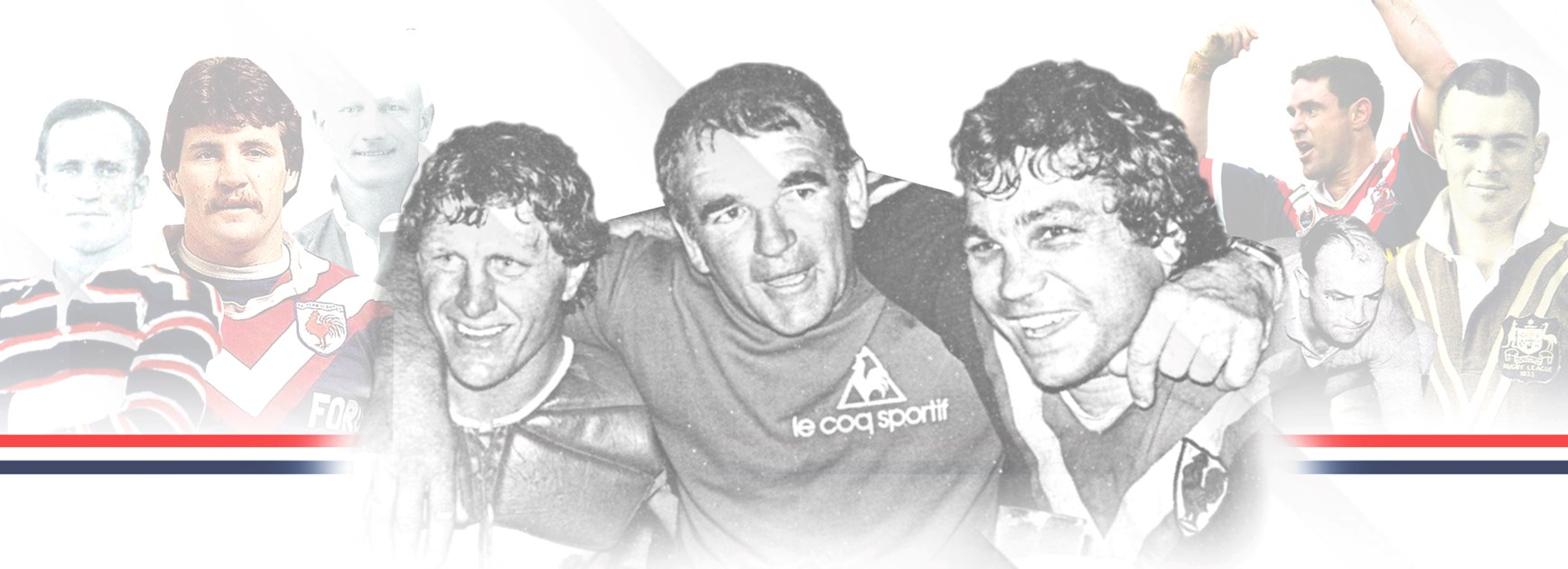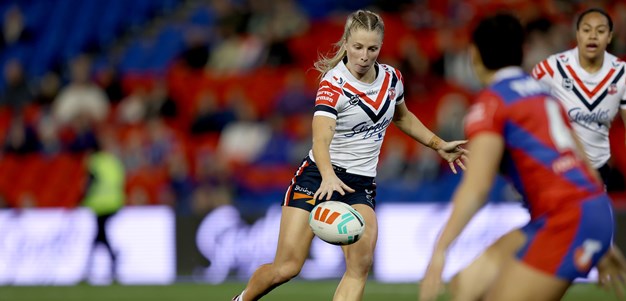
On Friday August 4, six extraordinary Sydney Roosters stars will be elevated into the Club’s Hall of Fame – the most prestigious honour that can be bestowed on a player or coach.
The six inductees will join the nine existing Hall of Fame Members, etching themselves into Club history books for their remarkable talent and unwavering dedication to the game of rugby league.
The current Hall of Fame members were inducted on two separate occasions, with Dally Messenger, Dave Brown, Jack Gibson, Arthur Beetson and Brad Fittler elevated in 2010, before Ray Stehr, Dick Dunn, Ron Coote and Kevin Hastings joined them in 2012. We take a look at the current Hall of Fame Inductees below:
Inductee 1 – Herbert Henry ‘Dally’ Messenger
Dally Messenger, Sydney Rooster #18, was Rugby League’s first ‘superstar player’ and first Hall of Fame Inductee. He was seen by many as the catalyst for the establishment of the code in Australia, after converting from rugby union.
Between 1908 and 1913 Messenger played 48 games for Easts and seven tests for Australia. He was a powerful runner of the ball, a solid defender and could kick goals from anywhere on the field.
He was the catalyst for the Club's first three Premierships, won in 1911, 1912 and 1913. Such was his contribution, the Club presented him with the Agricultural Shield at the conclusion of the 1913 triumph.
Hall Of Fame | Dally Messenger
Appropriately, one of the best to lace on a boot, he was honoured in 1980; bearing the name of the Player of the Year – the Dally M Medal – and was made one of Rugby League’s ‘Immortals’ in 2018.
Messenger was named in the Roosters All-Time Team from 1908-2007 – and was named in both the Australian Rugby League Team of the Century and the New South Wales Rugby League Team of the Century in 2008.
Inductee 2 – Dave Brown
Inducted in 2010, Dave Brown, Sydney Rooster #202, is well known as one of Easts most prolific point scorers and is referred to as the ‘Bradman of League’. He played 94 games for the Tricolours between 1930 and 1941 and coached the Club on 84 occasions.
After debuting for Easts in 1930, Brown suffered from a rare illness and in 1931 lost all his hair. He donned a leather headgear that became his trademark and dominated Rugby League both for the Roosters and for Australia.
Brown still holds the record for most tries scored in a season with 38, en route to the Club’s fifth Premiership in 1935. He was the youngest player to captain Australia, at only 22 years old.
Hall Of Fame | Dave Brown
Following his esteemed career on the field, Brown took over the head coaching role in 1943, before returning for three seasons between 1957-1959. After retiring from the game, the unofficial award for man of the match in the Grand Final was the Dave Brown Medallion until 1986 where it was renamed the Clive Churchill Medal.
Brown was named in the Australian Rugby League’s 100 Greatest Players in 2007 and the New South Wales Team of the Century in 2008, before becoming a Rugby League Immortal in 2018.
Inductee 3 – Jack Gibson
Renowned as the most legendary coach in modern rugby league, Jack Gibson, Sydney Rooster #418, took Easts to two premierships in 1974 and 1975, while also making his first-grade debut for the Tricolours in 1953, earning a reputation for being a tough and uncompromising forward
Gibson played 123 games for Easts between 1953 and 1961 before making the switch to coaching in 1967 – where he took Easts to the finals the year after the Club recorded a winless season.
Hall Of Fame | Jack Gibson
In 1974 and 1975 he took what is remembered as two of the best-ever Easts’ teams to consecutive Premierships, where he famously introduced a number of new coaching techniques and applications including video previews, skinfold testing, introducing the use of weights machines and creating an overall program of rehabilitation and fitness conditioning, now referred to as a high-performance unit.
In 1988 Gibson received an Order of Australia Medal for his contribution to Rugby League, and has since been honoured as Head Coach in Australian Rugby League’s Team of the Century, as well as having the Jack Gibson Medal and Jack Gibson Cup being named in his honour.
Inductee 4 – Arthur Beetson
Often referred to as the best prop Australia has ever seen, Arthur Beetson, Sydney Rooster #615 played 131 games for Easts between 1971 and 1978, captaining the 1974 and 1975 premiership-winning teams, and coached the Club between 1985 and 1988, earning the ‘Coach of the Year’ award in 1987.
In 2003 he was inducted into the Australian Rugby League Hall of Fame, and inducted as one of Rugby League’s Immortals. In 2008, in Rugby League’s Centenary year, Beetson was retrospectively awarded the Clive Churchill Medal, for the best player on the field, for the 1974 Grand Final.
Hall Of Fame | Arthur Beetson
Beetson was also named in Rugby League’s Team of the Century, QLD’s Team of the Century and the Indigenous Team of the Century that same year.
Following his tragic passing in December of 2011, the Arthur Beetson Medal was introduced in his honour, awarded to the man of the match for the annual Indigenous All Stars match.
In 2023, the Artie Legacy Medal was also established in his honour, awarded to the player of the match for each game between the Sydney Roosters and Dolphins.
Inductee 5 – Brad Fittler
The fifth and final inductee in 2010, Brad Fittler, Sydney Rooster #948, is one of modern Rugby League’s greatest players.
Fittler joined the Roosters in 1996 after debuting for Penrith in 1989, playing nine seasons for the Club and missing only 24 games in that time. He captained the Roosters to a premiership victory in 2002 as well as grand finals in 2003 and 2004.
In his time at the Club between 1996 and 2004, Fittler played 217 games, with a total of 409 games played at both Club and representative level. He is also the youngest male player to ever debut for NSW at 18 years and 114 days.
Hall Of Fame | Brad Fittler
Fittler was appointed interim coach in late 2007 after the resignation of Chris Anderson and was given the job full time for the 2008 and 2009 seasons. In 2008 he took the Sydney Roosters to fourth place and into the finals series, coaching the Club for a total of 58 games.
His achievements in the Red, White and Blue include most capped Captain in Club history with 199 games, tenth most-capped Rooster of all time with 217 games and is the Club's sixth-highest try-scorer with 91 tries.
Inductee 6 – Ray Stehr
Rae Stehr, Sydney Rooster #190, was the first player elevated into the Hall of Fame in 2012. Aged just 16 years and 85 days when he made his regular competition debut, he remains the youngest ever first-grade Australian player to do so.
Stehr played 184 games for Eastern Suburbs between 1929-46 and was a member of the side that lost just one match over the three seasons between 1935, 1936 and 1937, winning the premiership across each of those seasons. He won additional premierships with Easts in 1940 and 1945.
Hall Of Fame | Ray Stehr
After retirement in 1946, he remained involved with the game, coaching Manly in 1947-48 and Easts in 1949. He later wrote a column for many years in a Sydney newspaper and worked in television media. He was also Club President at Easts.
In 1961 he was the commentator for the first Australian Rugby League match ever broadcast live. His typical sign-off call in the media was always "Easts To Win!” – a phrase still embedded in the Roosters’ culture.
Inductee 7 – Dick Dunn
Dick Dunn, Sydney Rooster #253, was a local centre who played 124 games for the Club between 1938 and 1947, including Easts’ Grand Final win over Canterbury in 1940. But, it was for his phenomenal performance in the 1945 decider that he is best remembered.
Now revered as ‘Dick Dunn’s Day’, Easts trumped Balmain 22-18 in the Final, with the man of the moment claiming an emphatic 19-point haul with a hat-trick and five goals to his name.
Hall Of Fame | Dick Dunn
Dunn coached the Club in 1960, guiding the side to the Grand Final, later becoming Vice President of the NSWRL, a Chairman of the judiciary and co-manager of Australia’s tour of New Zealand in 1971. Dunn became a Member of the Order of Australia (OAM) in 1986.
Inductee 8 – Ron Coote
Ron Coote, Sydney Rooster #625, was famous for his remarkable cover defence and low tackling technique and is widely considered as one of the nation’s finest footballers of the 20th century.
He was a key member of the Roosters back-to-back Premiership-winning sides in 1974 and 1975, playing a total of 109 games for the Tricolours.
After football, Coote remained involved with the game as a member of NSWRL judiciary for much of the 1990s.
Hall Of Fame | Ron Coote
In 2000 he founded the Men of League program which supports former players, officials and referees who have fallen on hard times and remains the program’s President.
He was inducted into the Australian Rugby League Hall of Fame in 2005, was named in the list of Australia’s 100 Greatest Players in 2007 to celebrate the code’s centenary year in Australia and went on to be named in the second-row in the Australian Rugby League's Team of the Century. He is a Member of the Order of Australia.
The Ron Coote Cup, contested annually by the Sydney Roosters and South Sydney Rabbitohs since 2007, is named in his honour.
Inductee 9 – Kevin Hastings
Kevin ‘Horrie’ Hastings, Sydney Rooster #674, is the most recent Hall of Fame Inductee and the only member of the esteemed group to have played in the 1980s. He was the first Easts clubman to play 200 top grade games. He held the record for the highest number of first-grade games for Easts at 228, until broken by Luke Ricketson in 2002.
Playing with the Club between 1976 and 1987, the strong running halfback - noted for his clever style of play and ultra competitiveness - was a member of the 1980 Roosters side that featured in the Grand Final.
Hall Of Fame | Kevin Hastings
Hastings also garnered almost every major individual award in the early 1980s; he won the Rothmans Medal in 1981 and was named the Dally M Halfback of the Year in three consecutive years (1980-82). From 1980-82 he was also named Rugby League Week’s Player of the Year.
In 2007, Hastings was named in the Roosters 'Centurions', the greatest players to have played 100 games or more for the Club. The original Sydney Football Stadium (1988-2018) had a grandstand named in his honour.







